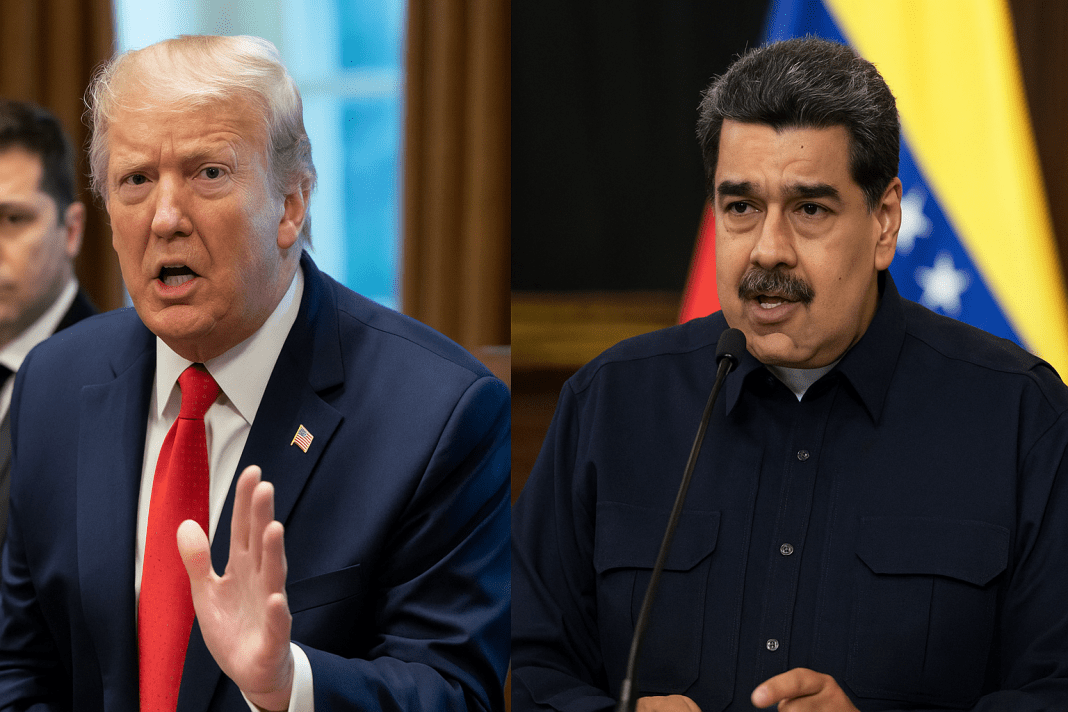In a moment that stunned reporters and political observers, U.S. President Donald Trump delivered a fiery warning to Venezuelan President Nicolás Maduro during a White House meeting with Ukrainian President Volodymyr Zelensky on October 17, 2025.
The meeting was meant to focus on Ukraine’s path toward peace with Russia, but it quickly shifted toward Venezuela after a journalist asked about the latest U.S. military actions in the Caribbean.
Trump, visibly animated, said Venezuela’s leader “had offered everything” to the United States and added bluntly that Maduro “doesn’t want to mess around” with America. The president used an expletive while making his point, leaving reporters momentarily silent before he abruptly ended the press conference with a brief “Thank you very much, everyone.”
While the live broadcast stunned viewers, White House Press Secretary Karoline Leavitt later posted a clip of Trump’s remarks online, punctuated with a “mic drop” emoji — a clear sign that the administration stood by the president’s blunt tone.
The exchange has since gone viral, drawing widespread reactions both within the United States and abroad.
Explosive Showdown: President of Venezuela Targets X
U.S. Strikes Spark Global Debate
Trump’s comments come as the United States continues a controversial series of military strikes in the Caribbean Sea, aimed at what the administration describes as “narco-terrorist” targets. These operations, launched on September 2, have targeted alleged drug-smuggling boats believed to be linked to Venezuelan criminal networks.
According to U.S. officials, the latest strike — the sixth in as many weeks — involved a submarine allegedly carrying large quantities of narcotics. Trump told reporters that the submarine was “built specifically for the transportation of massive amounts of drugs,” adding, “This was not an innocent group of people. I don’t know too many people who have submarines.”
The strike reportedly destroyed the vessel, leaving two survivors, who are now being detained by the U.S. Navy aboard a warship in international waters. It marks the first time during this anti-drug campaign that the U.S. military has taken prisoners instead of destroying all targets.
The president deferred questions about the detainees to Secretary of State Marco Rubio, who attended the same meeting. Rubio declined to provide details, saying, “We’re not prepared here to announce those details but you’ll get that information shortly.”
Vice President J.D. Vance and other senior officials were also present at the meeting, signaling that the administration views the Venezuela operations as a top national security issue.
While the White House maintains that the strikes are part of an international effort to combat drug trafficking, several world leaders and human rights organizations have raised concerns about the lack of transparency surrounding the missions.
Trump loses Nobel Peace Prize — Venezuela’s María Corina Machado takes the honor
According to sources cited by major media outlets, including The New York Times, international observers have questioned whether the U.S. has provided enough evidence to prove the targets were indeed drug traffickers. Some nations have even called for a United Nations investigation into the operations.
Inside the U.S., certain Republican lawmakers have also sought more information, saying Congress has not been fully briefed on the objectives or oversight mechanisms of these attacks.
Rising Tensions Between Washington and Caracas
Relations between the United States and Venezuela have been strained for years, but tensions have escalated sharply since early September, when Trump authorized direct military action against what his administration calls “narco-terrorist operations” linked to the Maduro government.
The U.S. does not recognize Nicolás Maduro as the legitimate president of Venezuela, describing his government as a “regime” backed by foreign powers such as China, Russia, and Iran.
In recent weeks, the situation has intensified as Trump reportedly gave the Central Intelligence Agency (CIA) permission to conduct covert operations inside Venezuela. These missions, though undisclosed in detail, are believed to target drug supply routes and communication hubs.
In response, Maduro has made several public appeals for peace, calling on the “people of the United States” to oppose war and instead promote dialogue. In a televised address, he said, “No war, yes peace,” attempting to ease growing fears of an escalation.
Reports from The New York Times suggest that Maduro has even offered a range of economic concessions to Washington. These include opening all existing and future oil and gold projects to U.S. companies, cutting ties with Chinese and Iranian firms, and prioritizing American investments in Venezuela’s natural resources.
According to Trump, these overtures prove that “he doesn’t want to mess around with the United States,” a comment that has since been repeated across news outlets worldwide.
Despite these gestures, diplomatic channels between Washington and Caracas remain minimal. The Venezuelan government has condemned the recent U.S. strikes as “acts of aggression,” claiming they violate international law and sovereignty.
Meanwhile, in the Caribbean, local authorities have reported increased naval and aerial activity from both U.S. and allied forces, suggesting that the campaign may continue in the near term.
The Bigger Picture
As of mid-October 2025, six confirmed U.S. strikes have been carried out near Venezuelan waters. The first attack, on September 2, reportedly killed 11 individuals allegedly linked to the Venezuelan gang Tren de Aragua, one of South America’s most feared criminal groups.
While the administration insists these operations are aimed solely at curbing drug smuggling and transnational crime, critics point to the limited public disclosure of target verification, survivor treatment, and evidence collection as causes for concern.
The White House, however, maintains that all actions are “lawful and necessary” under national security mandates. Trump’s strong language and unapologetic posture appear intended to send a message — both to foreign adversaries and domestic audiences — that the United States is prepared to take aggressive action to protect its interests.
For now, the world watches as Washington and Caracas stand on opposite sides of an increasingly volatile confrontation — one marked by fiery words, high-stakes military action, and deepening international concern.





